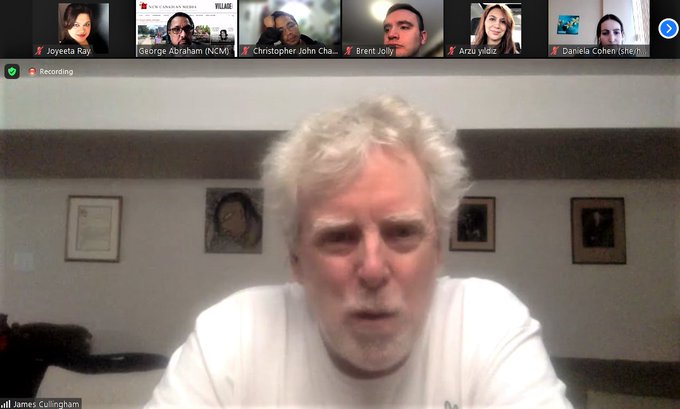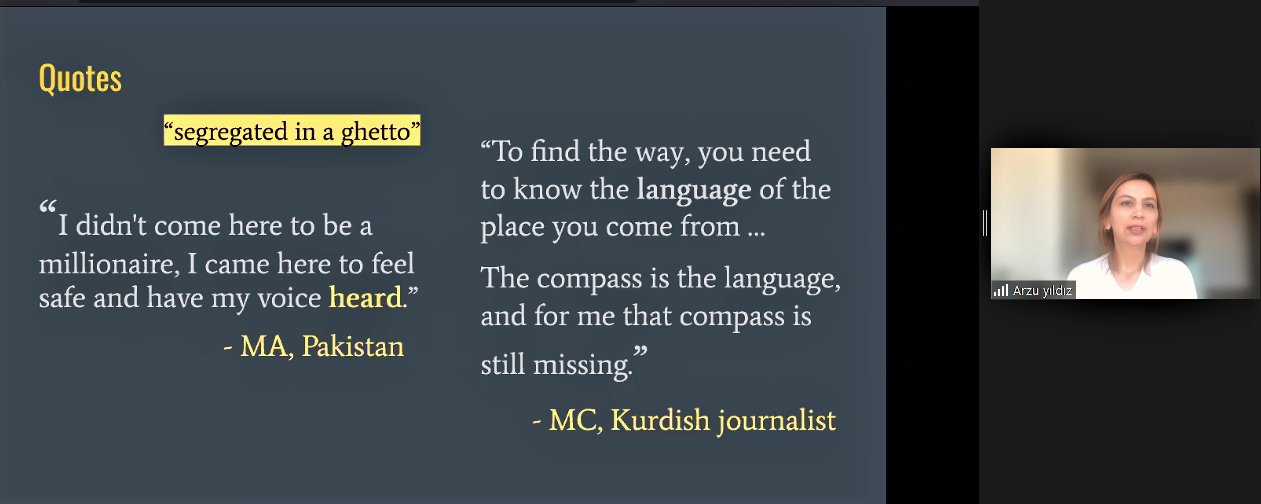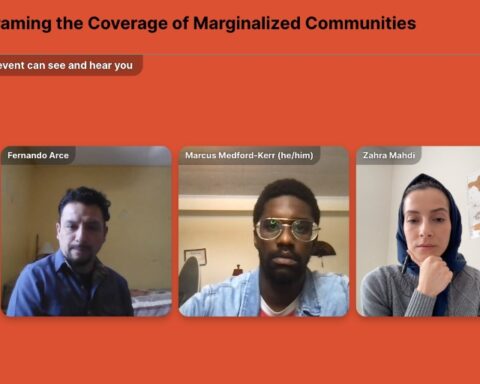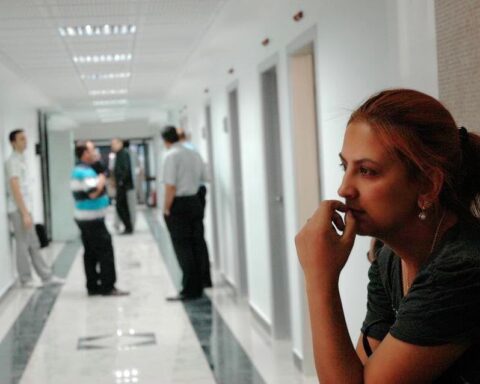A groundbreaking and heartbreaking study — but one that will hopefully forge new paths forward for immigrant and refugee journalists facing career dead ends in Canada — was released last week.
With concrete facts and figures documenting their socio-economic status in Canada and highlighting the psychological impact of knocking on unyielding doors, New Canadian Media’s report entitled “Breaking into the Canadian media industry: economic and social barriers for first-generation immigrant and refugee journalists,” was the first of its kind conducted in Canada. It challenged the country’s mainstream media industry to enrich its coverage of local and world issues by opening its doors to this untapped pool of talent, and to benefit from their experiences and unique perspectives.
A colloquium hosted last week by New Canadian Media publisher George Abraham, with the lead researchers Christopher Chanco, Arzu Yildiz and Alec Regino presenting the key facts, served as the launching pad for the report, and initiated what organizers hope will become a broad national conversation and a first step towards changing the demographics of Canadian newsrooms to reflect the country’s diversity. The virtual event also featured some of the protagonists who have been profiled in New Canadian Media stories.
Impact of exclusion on journalists’ mental health
Over 101 surveys conducted and analyzed by the researchers revealed that while 78 per cent of migrant and refugee respondents have worked in the media for over five years, and 93 per cent would like to continue their career as journalists, only 29 per cent of respondents are currently employed in the Canadian media industry.
Apart from the loss to the media industry, the most serious consequence of this lack of meaningful employment opportunities is the toll — intense frustration born of derailed careers and unfulfilled aspiration — it has taken on respondents’ mental health.
Two out of five immigrant and refugee journalists – the more fortunate ones – work as freelancers, are restricted to small community media outlets or typecast as “community or minority” reporters, and 59 per cent make less than $40,000 a year.
At the other end of the spectrum are those who are unemployed in the media industry and have suffered a loss that goes far beyond the lack of meaningful work.
Abdulrahman Matar, who earned fame as well as notoriety in his native Syria as an author of five books and an outspoken critic of the Assad regime, exemplifies the paradox of the human rights defender who was welcomed to Canada as such, but whose pen is no longer mightier than the sword in fighting the odds that are stacked against him.
Unable to find employment in his field, he now toils long hours on a factory floor in Canada, leaving him too exhausted to pursue his true passion.
“Over the last five years the Canadian government has hosted more than 800 journalists,” he told colloquium participants. “I have found safety here (his life is no longer in danger) but I have lost everything else — my career, my family and even my identity.”
Lack of support to build language skills
Several speakers expressed the view that the media industry’s doors are firmly shut against them for lack of “Canadian experience,” and in some cases — particularly among refugee journalists – due to linguistic barriers.
One of them, Arzu Yildiz, had worked as a journalist, editor and senior reporter before arriving in Canada. She produced significant pieces of investigative journalism about illegal arms supplies to Syria, and has authored four books. Yet, she is working as an Uber driver in Canada, while freelancing for New Canadian Media.
She admitted to language being a major barrier to transplanting her career.
“At age 40, I am too old to learn a new language, but the Canadian media and government don’t help us either,” she said. “New Canadian Media gives us some opportunity to practise my profession, but it’s not enough (to make a living).”
Moving to diversifying Canadian newsrooms
Despite all the stories of stalled careers and dashed hopes, the colloquium and the report provided some rays of hope for the future.
The presence of Brent Jolly, president of the Canadian Association of Journalists, ensured that the report would be widely disseminated and would be read by mainstream media employers.
“I have read the report and have asked how we can use the data to make diversity a fact in Canadian newsrooms,” he said. “There is a significant lack of diversity in the media ecosystem, and this needs to be addressed.”
Jolly invited New Canadian Media and its publisher to present the report at the annual conference of the Canadian Association of Journalists to be held in Montreal from May 27 to 29. He also said that new Canadian journalists are welcome to take advantage of the mentorship program offered by the CAJ.
Mike De Souza, chair of Press Forward and managing editor of The Narwhal, the multiple award-winning Canadian newspaper celebrated for its investigative journalism, who is one of the mentors in the CAJ program, said it is good to see concrete numbers in the report and reiterated Jolly’s invitation to use the mentorship program as a possible bridge into mainstream journalism.
Kaziwa Salih, who holds a PhD from Queen’s University and is a member of the New Canadian Media Collective, offered to use the report as the basis of a book — an idea that was enthusiastically received by colloquium participants.

Another awareness raising tool is the documentary The Cost of Freedom: Refugee Journalists in Canada by noted filmmaker James Cullingham, which features refugee journalists including Abdulrahman Matar and Arzu Yildiz. It documents their struggles against government repression in their home countries and the irony of finding safety but losing their voices in Canada.
“It has been screened at film festivals and will be shown at the CAJ conference,” Cullingham said.
Solutions proposed by the report include opening up more permanent staffing positions, and more internships and mentorship opportunities for immigrant journalists.
To learn more about the research study, click here.
Ottawa-based writer/journalist, editor, blogger, communications professional seeking freelance opportunities in political and travel writing.





